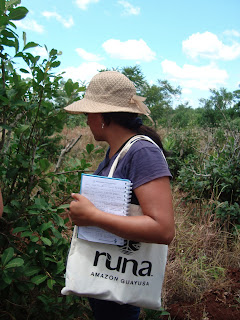In December I went on a work trip to Argentina with researchers and technicians from Runa to learn about Yerba Mate production. Yerba Mate (Ilex paraguariensis) is a relative of Guayusa (Ilex guayusa) and is native to the sub-topical region where Argentina boarders Brazil and Paraguay in the north. We visited the province of Misiones.
In Misiones, almost everywhere you look people are drinking yerba hot or cold mixed with lemon as "tereré". They put the dry yerba into a container called a "mate" with its metal straw and then they pour the hot water or the cold water with lemon and have a few sips. Often this is a communal act, people will share their mate with friends or family and always carry a thermos to continue to fill the mate. Below you can see Raul, our host at the Guayakí farm with his thermos and mate for refreshing tereré.
Yerba production is very industrialized, especially compared to the small scale farmers and singular, small guayusa production plant. We visited yerba farms, cooperatives, processing plants and research centers in order to learn from the Argentinian experience and see what lessons we could apply to Guayusa.
By far my favorite visit was to Kraus, a family-run organic and Fair Trade certified guayusa farm and factory. We went out into the fields to see the plants, that are pruned so that they grow like tall bushes rather than trees.
We were shown around the factory where they process the yerba, using a very different procedure than we do for guayusa. Instead processing the leaves like black tea, like we do with guayusa (withering the leaves and then drying them in ovens), they process leaves and small twigs first by exposing them to flame and very high heat for a few seconds, then drying them at a lower heat in ovens, then sizing them and storing them from 6 months to 2 years to allow time for the flavor to mature.
And finally, the mom of the Kraus family (pictured below third from the right) made us homemade pizza and little bread bites for lunch when we came back.
The Kraus family was very open with us and happily shared their knowledge with us. They were eager to embrace us as fellow pioneers in organic and fair trade production of a traditional beverage for export markets.
We also went to the Iguazú waterfalls on our last day in Misiones. It was an amazing experience to see that amount of water falling with such force!
It was a wonderful trip; we learned a lot that we brought back to share with our teams in Ecuador and were able to see a new place. I really enjoyed Misiones for its welcoming people, natural beauty and of course, the delicious tereré!
Love,
Aliana









Looks like you went right to the Devil's Throat! That's quite a place. Imagine being in a group including Catholic nuns and priests and me, being told by the guide to hurry up, or we'd be late for the Devil's Throat!
ReplyDeleteThe Kindle is increasing in popularity every day and this is driving a huge demand for Amazons e-book reader. After only a short time the huge demand is making it extremely difficult for Amazon.com to keep up with the high number of daily orders. Whether you simply write in your spare time or as a full-time income, you can take advantage of this craze and monetize the ever growing popularity of the Amazon Kindle by self-publishing your own e-book.
ReplyDelete